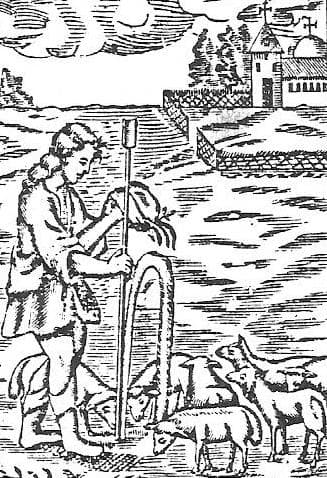
Blessed Gezelin Of Schlebusch
Blessed
Feast Day: August 6
Death: July 29, 1149
Biography
Blessed Gezelin of Schlebusch, also known by various names such as Gezelin of Altenberg, Gezelinus of..., Gezzelin of..., Gezzelino of..., Ghislain of..., Gisle of..., Gozelin of..., Jocelin of..., and Schezelinus of..., was a 12th-century hermit and Cistercian lay brother at Altenberg Abbey in Germany. Though not much is known about his early life, Gezelin is believed to have been born in an unknown location and year.
Gezelin found solace in a life of solitude and devotion, choosing to become a hermit and dedicating himself to a life of prayer and contemplation. He sought admission to the Cistercian Order, known for its strict adherence to the Rule of St. Benedict, and was accepted as a lay brother by the monks of Altenberg Abbey.
Within the abbey, Gezelin worked as a shepherd, faithfully tending to the flock entrusted to his care. Despite his humble occupation, Gezelin showed remarkable spiritual depth and a natural inclination towards miracles. It is said that during a severe drought, when crops and livestock were suffering, Gezelin, moved by compassion, thrust his shepherd's crook into the dry ground in desperation. Miraculously, a spring of water erupted from the spot, instantly relieving the parched land. To this day, the spring continues to flow, and the water is believed to possess healing powers.
The people in the surrounding areas soon began to seek Gezelin's presence and intercession, attesting to the miraculous power he possessed. News of his holy reputation spread, and many sought his prayers and advice on matters of spiritual significance. Gezelin, however, remained modest and preferred the solitude of his hermitage, shunning any form of personal acclaim or recognition for his miraculous acts.
Blessed Gezelin's life was filled with piety and simplicity. He embodied the fundamental virtues of humility, obedience, and poverty that characterized the Cistercian way of life. His devotion to God and his fellow men were marked by acts of charity and compassion. Gezelin's unwavering faith and devotion to his religious vows inspired those around him and drew many to seek a closer connection to God through his intercession.
In his final days, Gezelin fell ill and, aware of his imminent death, he prepared himself spiritually for the journey to the heavenly realms. With his eyes fixed on eternity, he passed away on July 29, 1149, within the walls of Gut Alkenrath in Schlebusch, Germany. His holy death was mourned by the monks of Altenberg Abbey and the faithful who had come to know him as a true beacon of faith and devotion.
Due to the extraordinary reputation and holiness of Blessed Gezelin of Schlebusch, his cultus, or popular devotion, flourished after his death. Recognizing the spiritual impact he had on the lives of many, the Bishop of Cologne, Germany, officially confirmed and beatified him. Today, Blessed Gezelin is venerated as a profound example of holiness and an intercessor for those seeking healing, both physical and spiritual, particularly through the water of the miraculous spring that still flows from the place where he struck the ground with his shepherd's crook.
The feast day of Blessed Gezelin of Schlebusch is celebrated on August 6th, commemorating the day of his entrance into eternal glory. His life and remarkable deeds continue to inspire and bring hope to all those who encounter his story.